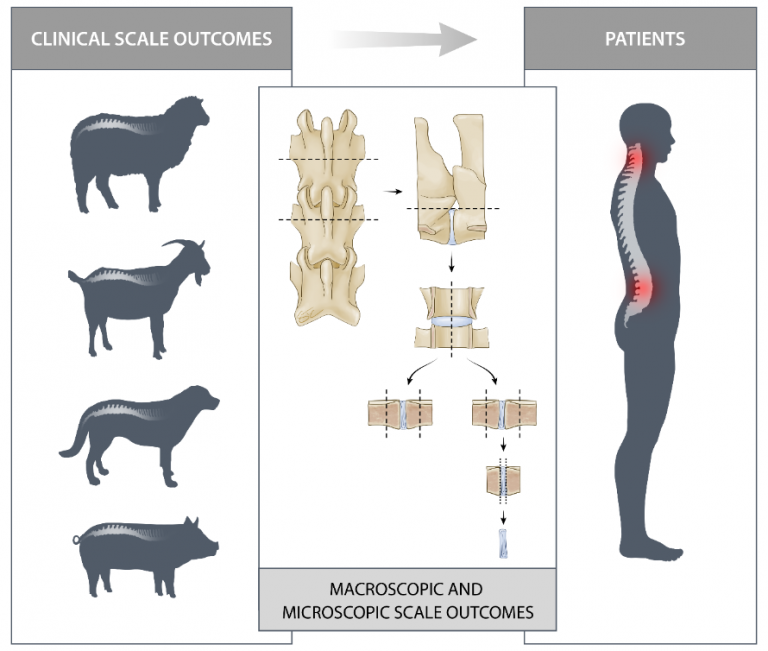New publication: A comprehensive tool box for large animal studies of intervertebral disc degeneration
A comprehensive tool box for large animal studies of intervertebral disc degeneration
Authors: Naomi N. Lee, Elias Salzer, Frances C. Bach, Andres F. Bonilla, James L. Cook, Zulma Gazit, Sibylle Grad, Keita Ito, Lachlan J. Smith, Andrea Vernengo, Hans-Joachim Wilke, Julie B. Engiles, Marianna A. Tryfonidou
First published: 14 June 2021
Abstract: Preclinical studies involving large animal models aim to recapitulate the clinical situation as much as possible and bridge the gap from benchtop to bedside. To date, studies investigating intervertebral disc (IVD) degeneration and regeneration in large animal models have utilized a wide spectrum of methodologies for outcome evaluation. This paper aims to consolidate available knowledge, expertise, and experience in large animal preclinical models of IVD degeneration to create a comprehensive tool box of anatomical and functional outcomes. Herein, we present a Large Animal IVD Scoring Algorithm based on three scales: macroscopic (gross morphology, imaging, and biomechanics), microscopic (histological, biochemical, and biomolecular analyses), and clinical (neurologic state, mobility, and pain). The proposed algorithm encompasses a stepwise evaluation on all three scales, including spinal pain assessment, and relevant structural and functional components of IVD health and disease. This comprehensive tool box was designed for four commonly used preclinical large animal models (dog, pig, goat, and sheep) in order to facilitate standardization and applicability. Furthermore, it is intended to facilitate comparison across studies while discerning relevant differences between species within the context of outcomes with the goal to enhance veterinary clinical relevance as well. Current major challenges in pre-clinical large animal models for IVD regeneration are highlighted and insights into future directions that may improve the understanding of the underlying pathologies are discussed. As such, the IVD research community can deepen its exploration of the molecular, cellular, structural, and biomechanical changes that occur with IVD degeneration and regeneration, paving the path for clinically relevant therapeutic strategies.

The ORS-Spine Large Animal Scoring Algorithm entailing clinical, macroscopic and microscopic scale outcomes was developed to guide preclinical large animal studies in the field of disc-related spinal pain. The guidelines enable researchers to design comparable studies and make informed decisions when structuring research questions and study designs. In depth understanding of the intricate relationship between molecular, cellular, structural, and biomechanical changes that occur with IVD degeneration and regeneration will help pave the path for clinically relevant therapeutic strategies in the field.
Funding information: H2020 European Institute of Innovation and Technology, Grant/Award Number: The research has been supported by the iPSpine H2020 project (https://ipspine.eu) under the contract #825925.; Schweizerischer Nationalfonds zur Förderung der Wissenschaftlichen Forschung, Grant/Award Number: 310030E_192674/1.

